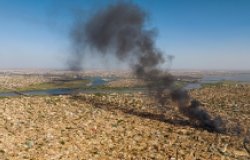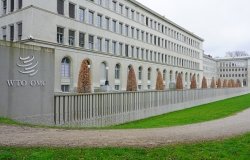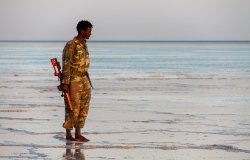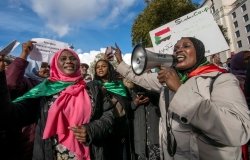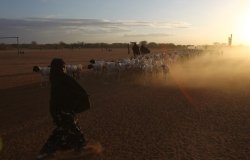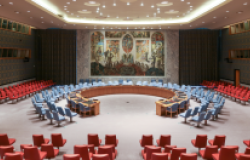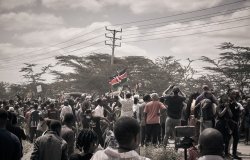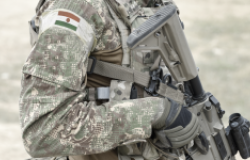
A blog of the Africa Program
Geopolitics and International Law: The Case of Africa and the ICC

Over the past few weeks the international community has been reeling from Sudanese President Omar Al-Bashir's visit to South Africa, which is largely being touted as a flagrant disregard for international law. Al-Bashir is wanted on charges of war crimes, crimes against humanity, and genocide in connection to the Darfur conflict, responsible for 300,000 deaths and the displacement of over two million people since 2003.
There had been debate days before the African Union summit, with world leaders and organizations weighing in on the lawfulness of South Africa receiving a head of state with an ICC warrant out for his arrest. On Sunday, June 14, the State Department released a statement announcing "The United States is deeply concerned by Sudanese President Omar al-Bashir's travel to South Africa for the African Union summit." It called on South Africa to "support the international community's efforts to provide justice for the victims of these heinous crimes." In addition, many human rights organizations publicly called for the arrest of President al-Bashir. However, African nations were either silent on the matter or fought back with rhetoric citing the ICC's unfairness in prosecuting Africans.
The multinational dialogue spurred by al-Bashir's continued evasion of the ICC is merely the newest chapter in the debate over the role and effectiveness of international institutions and law. Yet it also sheds light on an equally important issue — the relationship of Africa to international institutions such as the ICC, as well as the complicated and evolving relationship of Africa to the West and global powers.
So What Happened?
President al-Bashir was attending an African Union Summit meeting for the continent's leaders when a human rights group, the Southern Africa Litigation Centre, petitioned the South African High Court for his arrest. Although a judge ruled on Sunday, June 14, interestingly the same day as the State Department released it's views on the issue, that President al-Bashir was to remain in South Africa while the courts decided his fate, the government allowed him to leave on Monday, before the court issued its ruling that he be arrested and brought to The Hague. To some, this was a clear violation of the ICC's Rome Statute, while others claim conflicting international norms of diplomatic immunity render the situation more complex.
Competing Views
President al-Bashir's visit has caused division within the South African elite between those who believe he deserved diplomatic immunity and those who are adamant that South Africa had an obligation to arrest him.
South African President Jacob Zuma and the ANC have stuck to the assertion that because al-Bashir was in South Africa at the invitation of the African Union, and not the South African government, he enjoyed diplomatic immunity. Cooperative Governance and Traditional Affairs Deputy Minister Obed Bapela adamantly stated that the African Union should not be used as a platform to arrest leaders, and that such a request would be unthinkable if al-Bashir was attending a United Nations or any other IGO meeting. Those who side with the Zuma regime also cite concerns over the fairness and effectiveness of the ICC. Broadly, the African Union's position is that South Africa should not have to defer to a court which targets Africans. This critique draws on the fact that while the ICC is considering a more diverse set of cases, the only people actually indicted by the court have all been African. The AU has used this to justify threats of an African Union exit from the Rome Statute if cases from other regions are not pursued.
For the AU, the reason behind the Afrocentric indictments is geopolitical and stems from great power politics. Africa does not fall high on the list of many countries' strategic priorities, and the political and strategic fallout from prosecuting African leaders would not be as great. For example, Uganda or Sudan cannot leverage the same hard power that the United States could if the ICC tried to pursue President Bush for war crimes in Iraq, as some leaders have called for. In addition, the United States, Russia, and China are not parties to the ICC's Rome Statute and can veto any UN Security Council referrals of potential cases to the ICC. So theoretically the United States could veto Israel being referred to the court or Russia could block President Bashar al-Assad's referral. Because of this, ICC detractors believe the court is harmed by its voluntary nature — only those who have signed the Rome Statute are held legally responsible for violations of international human rights law.
On the other side of this controversy are those who are appalled by South Africa's failure to arrest al-Bashir. This camp is composed of human rights and legal groups outside of and within South Africa. Their main argument is that diplomatic immunity does not trump an ICC warrant and that, as a signatory to the Rome Statute South Africa had the responsibility to arrest the president. The most scathing arguments shame the government for betraying the ideals of late President Nelson Mandela, who made human rights a feature of South Africa's foreign policy after apartheid. Citizens are also angry at the government for disregarding justice and the rule of law by ignoring the court's order. Those who are in favor of continued support for the ICC noted that as imperfect as the system is, it is the only way for many of these victims to get justice, as domestic legal systems lack power and independence.
Rogue Foreign Policy?
Africa at large has long desired to be put on equal footing with the rest of the world's powers. As a consequence, African solidarity has become a feature of African relations and how the continent interacts with the rest of the world with the AU being its most recent incarnation.
The African Union, currently chaired by Zimbabwe's Robert Mugabe, has indicated that the AU would be better off withdrawing its support from the ICC because of the court's bias in prosecuting African leaders. The world's powers condemn this notion, criticizing Africa for not wanting to make commitments to human rights and justice or to fulfill the obligations of "advanced" or "democratic" states. This is not an unreasonable claim considering the man calling for the AU's exit has been in power for nearly thirty years. However, the allegation is weakened when you look at the record of the world powers criticizing South Africa. The United States, Russia, and China have not signed onto the Rome Statute and human rights abuses in countries like Burma, Venezuela, Colombia, Iraq, Syria, and Afghanistan have gone unpunished.
A recent Guardian article suggested that because of the recent events surrounding President al-Bashir, South African foreign policy has gone rogue in its disregard for international law and justice. This criticism highlights a broader contention in North-South relations; Western powers insist on accountability for African nations while hiding behind musings of sovereignty to avoid any accountability themselves. And here is the fundamental tension in North-South relations: developed countries try to hold Africa to a higher standard than they hold themselves. South African foreign policy hasn't "gone rogue;" it's learned to play in the big leagues. Other nations have received President al-Bashir while he has been wanted for arrest, yet none received the sort of criticism that South Africa did. Because South Africa has made huge commitments to human rights and has incorporated ICC principles into its constitution, it was a greater shock and disappointment to the world that the government did not arrest al-Bashir. However, the geopolitical reasoning behind South Africa's actions is a direct homage to the tactics of the powerful. It chose African unity over justice to strengthen its position on the continent, especially after it has lost favor with many countries over the recent xenophobic murders.
A Future for the ICC?
In order for Africa to move forward in its quest for equality on the world stage, perceptions need to change. Africa needs to be able to trust international institutions and perceive that it is not being persecuted by its former colonial powers or being kept down by the developed world. The Africans being brought to the court are not innocents, but other countries unfairly escape prosecution because of their great power status or who their allies are. The ICC is an avenue where great powers can make good faith concessions to Africa by bringing non-Africans to trial. However, these nations are unlikely to initiate reform that would restrict their power and privilege. This begs the question of what place the ICC will have in the future international system. Currently 123 members are party to the Rome Statute, and 34 of those are African. If disillusionment continues and Mugabe's threats to exit the ICC hold true, less than half of the world's nations will be held accountable to the court. The opposite route is to scrap the ICC altogether and convene ad hoc courts similar to the tribunals for the former Yugoslavia or the Gacaca court system in Rwanda. However, that comes with its own set of issues and necessitates a large scale atrocity before action is taken.
The biggest challenge the ICC faces is legitimacy. If there truly is to be a world court where the worst criminals can be brought to justice, every nation must be held accountable. Powerful nations need to hold themselves to the same standards that they hold the rest of the world. If Kenya wants to refer Syria or the United States to the ICC, it should be able to do so without a veto from the UN Security Council. Geopolitics cannot reign supreme. But that is wishful thinking.
About the Author
Angeline Apostolou

Africa Program
The Africa Program works to address the most critical issues facing Africa and US-Africa relations, build mutually beneficial US-Africa relations, and enhance knowledge and understanding about Africa in the United States. The Program achieves its mission through in-depth research and analyses, public discussion, working groups, and briefings that bring together policymakers, practitioners, and subject matter experts to analyze and offer practical options for tackling key challenges in Africa and in US-Africa relations. Read more

